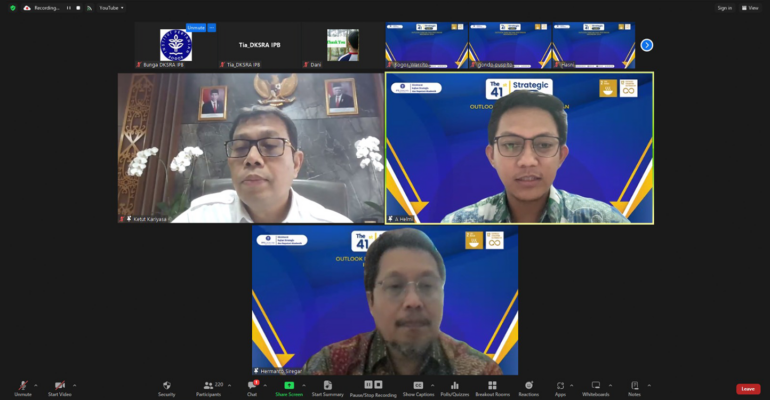Indonesia’s Food and Agriculture Outlook 2024: Building Ideas for Food and Agriculture Policy Strategies

In 2024, the transition of national leadership will certainly have an influence on strategic food and agriculture policies in Indonesia. At the same time, the food and agriculture sector is also faced with global geopolitical shocks, the threat of climate change, and post-Covid-19 economic recovery.
The Directorate of Strategic Studies and Academic Reputation (DKSRA) of IPB University held “The 41st Strategic Talks: Indonesia’s Food and Agriculture Outlook 2024” in order to gather the thoughts of experts to build policy strategy ideas in Indonesia’s future food and agriculture governance. The activity was held online, on Tuesday, 23/1.
The 41st Strategic Talks this time was opened by Prof Ernan Rustiadi as the Vice Rector for Research, Innovation and Agromaritime Development of IPB University. On this occasion, he reminded us of Indonesia’s vision in organizing food as stated in Law Number 18 of 2012.
“Indonesia has a vision to realize food sovereignty, independence and security. Therefore, it is necessary to clarify the realization of Indonesia’s efforts in achieving these three visions,” said Prof Ernan.
Professor of Macroeconomics at IPB University, Prof Hermanto Siregar delivered material related to Indonesia’s 2024 economic outlook. He explained that the global economy in 2024 is expected to be similar to 2023 where trade volume will tend to decline and price levels will depend on the development of global geopolitical conditions.
“Responding to these economic conditions, the agricultural sector must have a significant increase in production, both for food crops, horticulture, palm oil, rubber and others,” said Prof Hermanto.
“Another important issue is related to the welfare of farmers. Apart from subsidy guarantees, agrarian reform must run effectively so that marginalization or land fragmentation does not continue to occur,” he added.
Meanwhile, Professor of Agricultural Economics at the University of Lampung, Prof Bustanul Arifin, explained the importance of government efforts to commit to a strategy of change in agriculture towards sustainable agriculture. This strategy can be achieved through technological changes, organic farming, and environmentally friendly cropping patterns.
“With the development of sustainable agriculture, we will have a better alternative scheme that is adaptive to climate change,” he explained.
Another resource person, Chairman of the Planning Bureau of the Secretariat General, Ministry of Agriculture of the Republic of Indonesia, Dr I Ketut Kariyasa delivered material related to the Strategic Program for Agriculture and Food. He revealed, in 2024, the Government Work Plan (RKP) raised the theme “Accelerating inclusive and sustainable economic transformation”.
“With this theme, the Ministry of Agriculture of the Republic of Indonesia translates it into four work programs, namely first, the program of availability, access and consumption of quality food. Second, the program for added value and industrial competitiveness. Third, vocational education and training programs. Fourth, management support programs,” he said.
(NZR/Lp) (IAAS/HLF)


